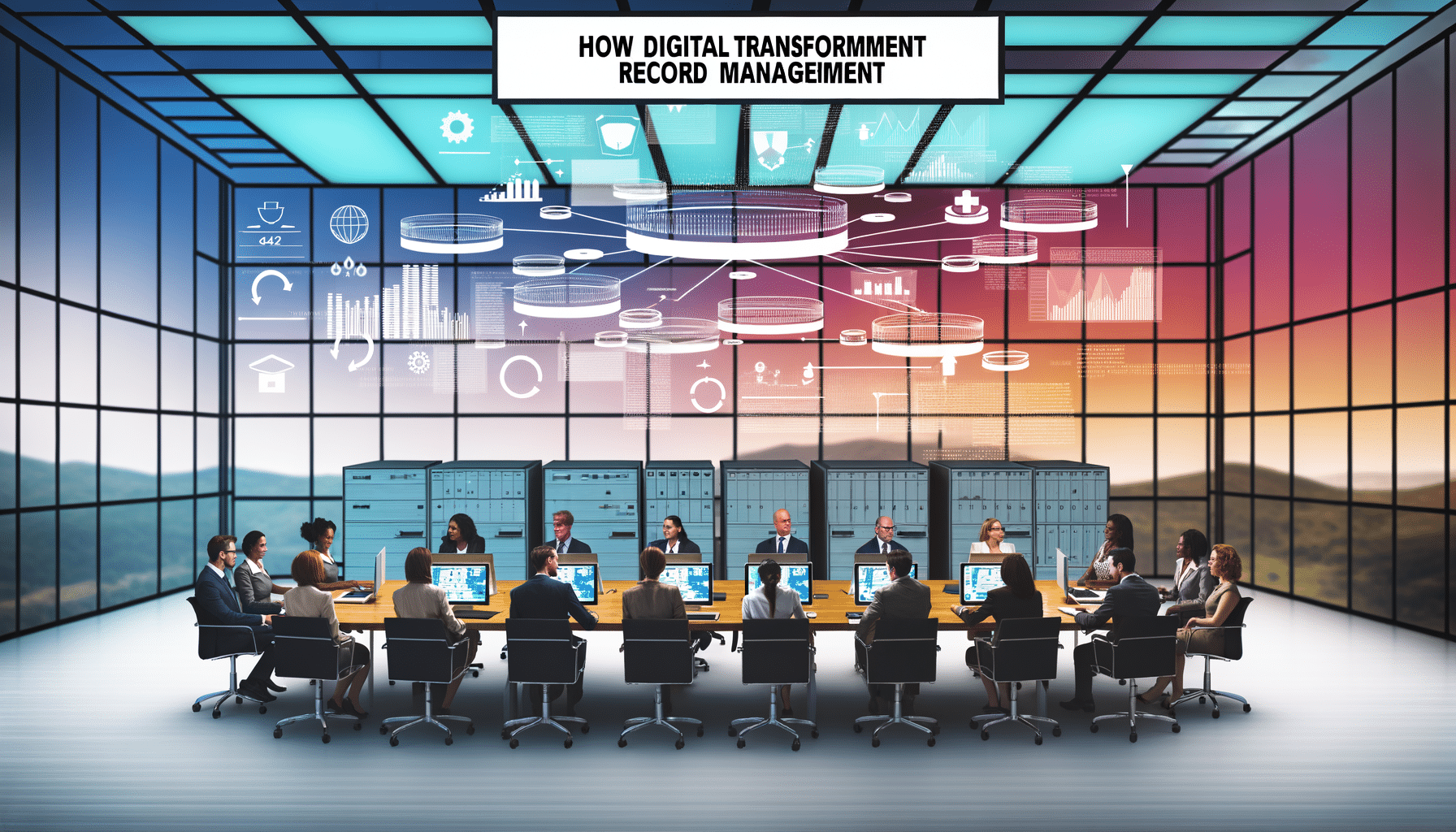- Digital Government
- April 28, 2024
How Digital Transformation is Changing Government Record Management

Introduction
The rapid pace of technological advancement is reshaping the landscape of how governments manage their records. This transformation isn’t merely about adopting new technologies but involves a fundamental shift in how information is created, accessed, and maintained. As someone deeply ingrained in the intersection of technology and record management, I’ve seen firsthand the seismic shifts digital transformation is bringing to government record management. From fostering transparency to enhancing security, the integration of digital tools is renewing the entire ethos of governance.
The Shift Towards Digital Transformation
Digital transformation has become a buzzword, yet its significance is profound, especially in the realm of government records. Traditionally, government record management relied on paper-based processes, susceptible to errors, inefficiencies, and security risks. The evolution to digital record management isn’t just a technological upgrade—it’s a necessity.
Enhanced Efficiency: Digital transformation allows for rapid processing of records, automated workflows, and instant retrieval. For government departments drowning in paperwork, this means a significant reduction of bureaucracy and faster response times to public inquiries.
Improved Access and Transparency: Digitally managed records enable government entities to provide access to documents with transparency, offering citizens the power to stay informed and engaged. This shift not only builds public trust but also fosters accountability.
Overcoming Challenges with Digital Solutions
Transitioning to digital record management isn’t without its hurdles, particularly in the governmental sector known for its inertia. However, advances in digital tools and platforms significantly mitigate these challenges.
Data Security: One of the paramount concerns in government records is ensuring data security. With digital transformation, robust encryption technologies and secure data rooms enhance record protection, preventing unauthorized access and safeguarding sensitive information.
Compliance and Regulation: Government agencies must navigate a maze of regulations like GDPR and HIPAA. Digital solutions offer seamless compliance management, automatically enforcing regulatory adherence through pre-configured workflows and policy enforcement.
Automation and Innovation in Record Management
Digital platforms like RecordsKeeper.AI harness the power of AI and Blockchain to revolutionize record management. Our journey in developing RecordsKeeper.AI involved addressing the innate complexities of government record handling and introducing solutions that are both innovative and practical.
AI-driven Categorization: The use of AI in record management transforms how records are categorized and retrieved. By automating these processes, there’s a dramatic reduction in human error, and users gain the capability to execute natural language queries effectively.
Blockchain Integration: Utilizing Blockchain technology creates an immutable and tamper-proof record. This not only ensures data integrity but offers a transparent audit trail, critical for government accountability.
The Future of Government Record Management
As government entities continue to evolve, the implications of digital transformation on record management will only intensify. We’re heading towards a future where blockchain-backed authenticity and AI-assisted insights become the norm. For governments willing to embrace these innovations, the benefits are enormous—leaner processes, enhanced public service delivery, and greater operational transparency.
The story of digital transformation in government record management is one that resonates with my passion for technology and its application in solving real-world problems. At RecordsKeeper.AI, we envision a future where every government department can leverage our platform to turn record management from a daunting task into a strategic asset.
Conclusion
In summary, digital transformation is drastically changing the dynamics of government record management. By embracing technologies like AI and blockchain, governments can streamline operations, ensure compliance, and enhance data security. As we continue to develop and refine tools like RecordsKeeper.AI, my invitation to you is clear: join us on this transformative journey. To those managing records in government offices, consider digitization not as a mere option, but as a pivotal evolution necessary for modern governance.
Discover our resources, follow our progress, and see how digital transformation can redefine your own approaches to record management. Let’s embark on this exciting path of innovation together, dedicated to advancing recordkeeping for a future ready government.
Toshendra Sharma is the visionary founder and CEO of RecordsKeeper.AI, spearheading the fusion of AI and blockchain to redefine enterprise record management. With a groundbreaking approach to solving complex business challenges, Toshendra combines deep expertise in blockchain and artificial intelligence with an acute understanding of enterprise compliance and security needs.
Archives
- January 2025
- December 2024
- November 2024
- October 2024
- September 2024
- August 2024
- July 2024
- June 2024
- May 2024
- April 2024
- March 2024
- February 2024
- January 2024
- December 2023
- November 2023
- October 2023
- September 2023
- August 2023
- July 2023
- June 2023
- May 2023
- April 2023
- March 2023
- February 2023
- January 2023
- December 2022
- November 2022
- October 2022
- September 2022
Want to get more content like this?
Signup to directly get this type of content to your inbox!!
Latest Post
Document Control for Equipment Maintenance
- January 20, 2025
Managing Records for Multiple Clients
- January 19, 2025
Handling Conference Documentation
- January 18, 2025
Setting Up Department Record Reviews
- January 17, 2025





